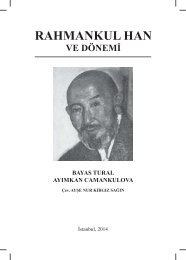THE SOVIET HISTORIOGRAPHY AND THE QUESTION OF KAZAKHSTAN’S HISTORY
SOVYET-TARIH-YAZICILIGI-ENG
SOVYET-TARIH-YAZICILIGI-ENG
Create successful ePaper yourself
Turn your PDF publications into a flip-book with our unique Google optimized e-Paper software.
<strong>THE</strong> <strong>QUESTION</strong> <strong>OF</strong> <strong>KAZAKHSTAN’S</strong> <strong>HISTORY</strong> 191<br />
KAZAN TATARS’ ETHNIC BACKGROUND <strong>QUESTION</strong>:<br />
A REVIEW ON <strong>THE</strong> EFFECTS <strong>OF</strong> <strong>SOVIET</strong> <strong>HISTORIOGRAPHY</strong><br />
Dr. Liaisan ŞAHİN *<br />
What is history? Simply speaking, history is the sum of past events. On<br />
an individual basis, in other words, speaking from the aspect of an individual’s<br />
psychology, we observe that the memories of the past constitute<br />
the core of our consciousness. All spent days left a trace in our minds.<br />
Accumulated traces and their memories create our personality. A scholar<br />
asserts: “In each moment, we are the sum of our all previous moments.<br />
We are the results of our all past experiences. [...] Recalling past is vital<br />
for our identity awareness: Knowing ourselves verifies our existence.” 345<br />
Let us suppose that we lost our memory along with our all memories<br />
as a result of an accident. As medical cases demonstrate, the<br />
personalities of the patients suffering from memory loss degrade.<br />
Those patients get isolated from the society as a result of the decline<br />
in emotional capabilities and reasoning power. 346 Under the light of<br />
these data, we can conclude that our memory creates our personality.<br />
Similar to the dependence of the individual personalities to the<br />
memory, collective personalities depend on the perception of the<br />
past. Communities amass memories of past events. These memories<br />
were recorded with oral history methods before (narratives, legends<br />
etc.). In modern times, events are recorded via several mechanisms.<br />
The science of history rises on the basis of these records; that is,<br />
recording the past becomes an expertise. In the past, poets pioneered<br />
the protection of collective memory; whereas, in modern times, they<br />
are replaced by professional historians.<br />
If historians are not allowed to conduct their research without<br />
disturbance and to search the truth and if their spiritual world is<br />
restricted with the narrow boundaries of a certain ideology, the loss<br />
of collective memory becomes inevitable and this leads to a serious<br />
trauma. There are several significant events resembling this loss in<br />
Soviet-era historiography. This article will focus on the Soviet historiography’s<br />
destruction of the history of Kazan Tatars and its societal<br />
consequences. This discussion will be evaluated on the basis of Kazan<br />
*<br />
Marmara University, Institute of Turkish Studies.<br />
345 Lowenthal, D., Past is a Foreign Country, Cambridge, NY: Cambridge University<br />
Press, 1985, pp. 185; 197.<br />
346 Ibid, pp. 197-198.



